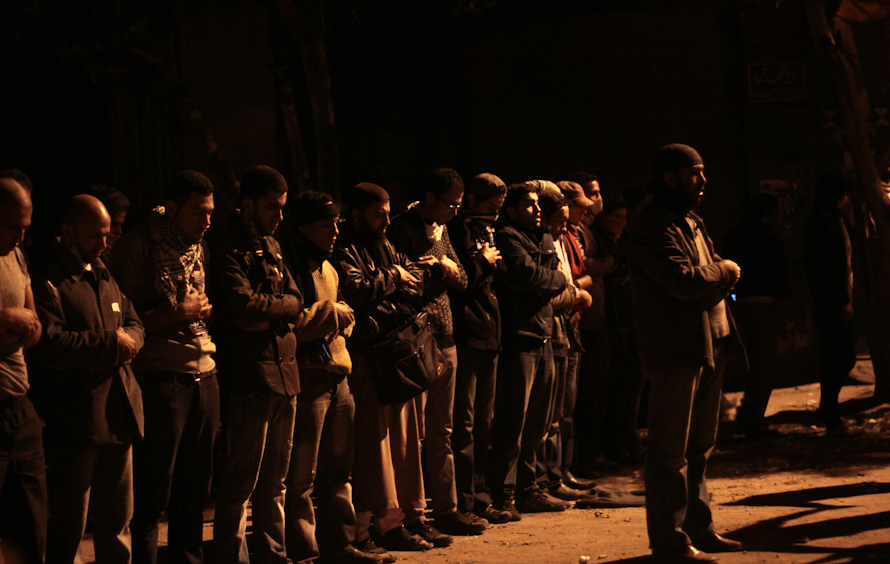Last Monday outside an Egyptian courtroom, families wept and women fainted after a judge passed down a mass death sentence to more than 680 people on charges related to an attack on a Minya police department last year. The attack took place on August 14, after government forces launched a deadly offensive against pro-Morsi protesters conducting sit-ins in Cairo. Crowds in other areas of Egypt attacked police departments and churches as the news spread. By the end of the day, considered the “bloodiest” since the revolution, more than 200 Morsi supporters and 40 police officers were killed. The attack on the Minya department – the subject of the trial – resulted in the death of one officer.
Sham Trial
The mass sentencing is a thinly veiled political trial and has wrecked the credibility of the Egyptian justice system. All 680 Egyptians were accused of being members or supporters of the Muslim Brotherhood – Mohamed Badie, the supreme guide of the brotherhood is among the defendants – but stories of individual defendants are emerging from family members indicating that some have no connection to the outlawed organization aside from their religion. Additionally, the connection of the hundreds of defendants to the August attack is dubious. The BBC quoted a defense lawyer Khaled Elkomy, who claimed that 60 percent of defendants have evidence that proves they were not present during the raid on the police department. Commentators expect most of the verdicts of the 638 citizens to be overturned; the mass death sentence is simply intimidation for the opposition. All but approximately 60 defendants were tried in abstentia and those who are not in custody and turn themselves have the right to a retrial. Also, of the 529 defendants sentenced to death in a separate trial, held in March and resided over by the same judge, 492 of the sentences were commuted to life in prison.
The ruling has been denounced by organizations around the world as a brazen human rights violation. The U.N. High Commissioner for Human Rights, Navi Pillay, condemned the actions. In a press conference, the U.N. human rights spokeswoman said of the Egyptian hearings: “It is clearly and absolutely not considered to be a fair trial. Most of the defendants were tried in absentia, most of them did not have access to lawyers, apparently the defence did not have an opportunity to cross-examine witnesses. These are very, very basic fair trial guarantees.” The Eureopean Union’s foreign policy chief expressed concern for Egypt’s compliance with international human rights policy and questioned Egypt’s commitment to transition towards democracy.Strategic Allies
The mass death sentence has put a strain on the United States’ already tense relations with Egypt. Egypt has been a strategic ally to the U.S. since the Mubarak regime in a geopolitical sphere that has dominated American foreign policy for more than a decade. Egypt has historically been one of the largest recipients of (primarily military) U.S. aid, but last July this came into question. After the Egyptian military deposed the democratically elected Morsi, the U.S. imposed sanctions on the regime by suspending aid and weapons shipments. By January Congress relented, appropriating $1.5 billion in aid and on April 23rd, barely a week before the most recent mass death sentence, the U.S. pledged 10 Apache helicopters to Egypt.
But to the frustration of the State Department, and the approval of human rights advocates, Senator Patrick Leahy (D-Vt.), the chairman of the Senate subcommittee on foreign aid, blocked further military aid to Egypt in light of the recent trials. On Tuesday on the Senate floor, Leahy stated, “It’s an appalling abuse of the justice system, which is fundamental to any democracy. I am not prepared to sign off on the delivery of additional aid to the Egyptian military … until we see convincing evidence that the government is committed to the rule of law.” Leahy is not alone; legislators from both parties came out against continuing aid in a House foreign affairs subcommittee hearing. This pits Congress against the State Department and state leaders will soon need to come to a cohesive conclusion after weighing strategic global interests against national integrity. According to D.C. insiders, thus far the Obama administration’s policy on Egypt has seemed “contradictory.” It’s unlikely the administration will be capable of walking the fine line of maintaining the U.S./Egypt strategic relationship (which requires the generous military aid Egypt has become used to), while encouraging the military regime to move in a more progressive direction. President Obama is undoubtedly in a tight spot, and the Egyptian foreign minister Nabil Fahmy did not hesitate to exploit America’s renewed concerns over spheres of influence. During his visit to Washington last week he said Egypt is looking to, “diversify its portfolio of strategic and economic relationships”, and that “our emerging relationship with Russia is one that we will seek to nurture and leverage”.
